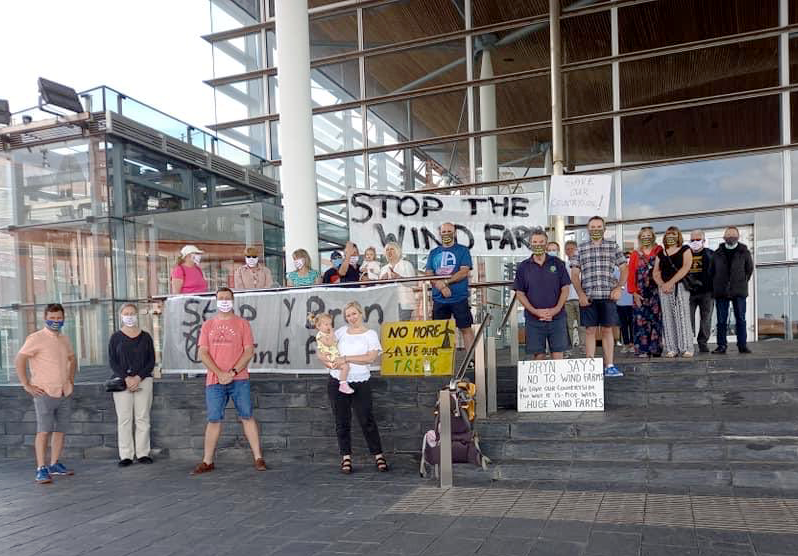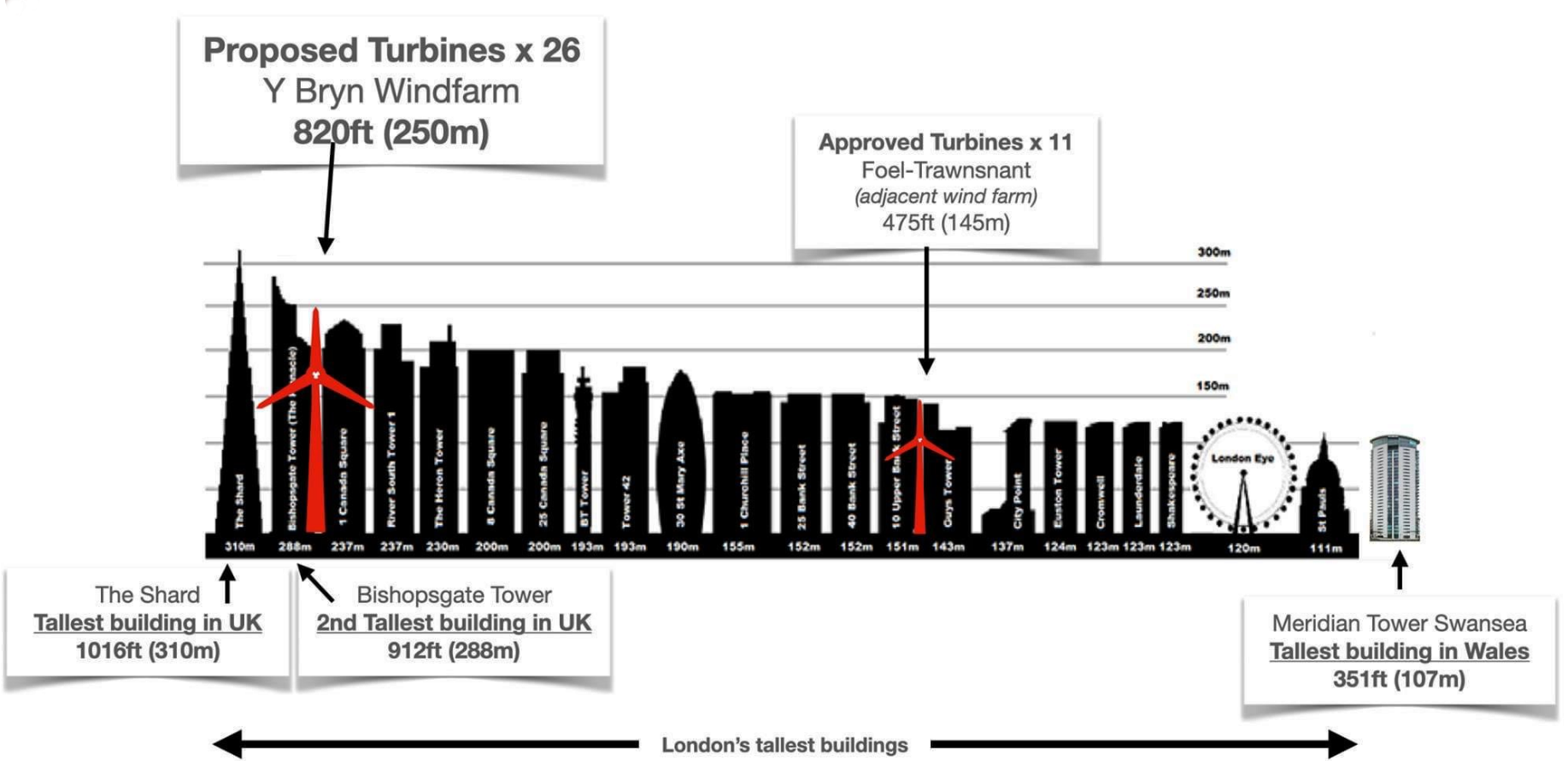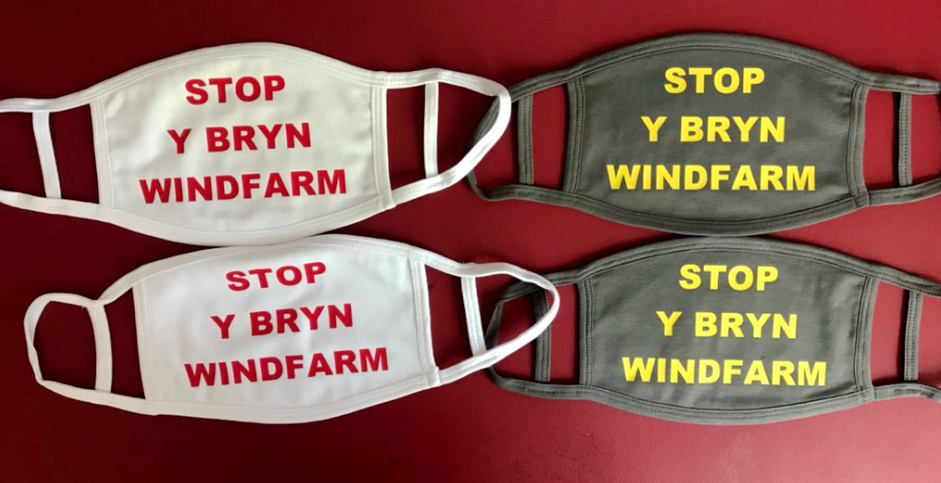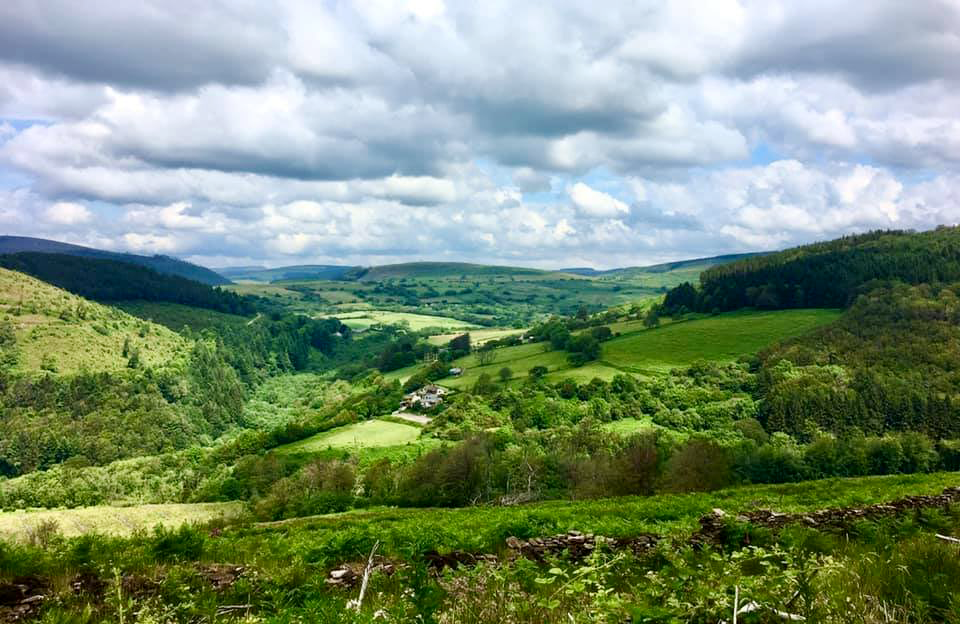![]() I hadn’t planned on putting out a post this week. But people contact me and say, ‘Have you seen this, Jac?’; and most of the time I can politely respond and let it pass. But now and again I get a clutch of reports or leads that are worth bringing together in a post like this.
I hadn’t planned on putting out a post this week. But people contact me and say, ‘Have you seen this, Jac?’; and most of the time I can politely respond and let it pass. But now and again I get a clutch of reports or leads that are worth bringing together in a post like this.
It’s big, 4,500+ words, but as I always say, you can take it a section at a time.
And because it’s so big, and it’s taken so much work, don’t expect anything next week.
♦
SYCHARTH UPDATE
The previous post was about my visit to Sycharth on September 16, and my disappointment with state of the site. Which prompted a reader to write to Cadw, the agency responsible for conserving our heritage.
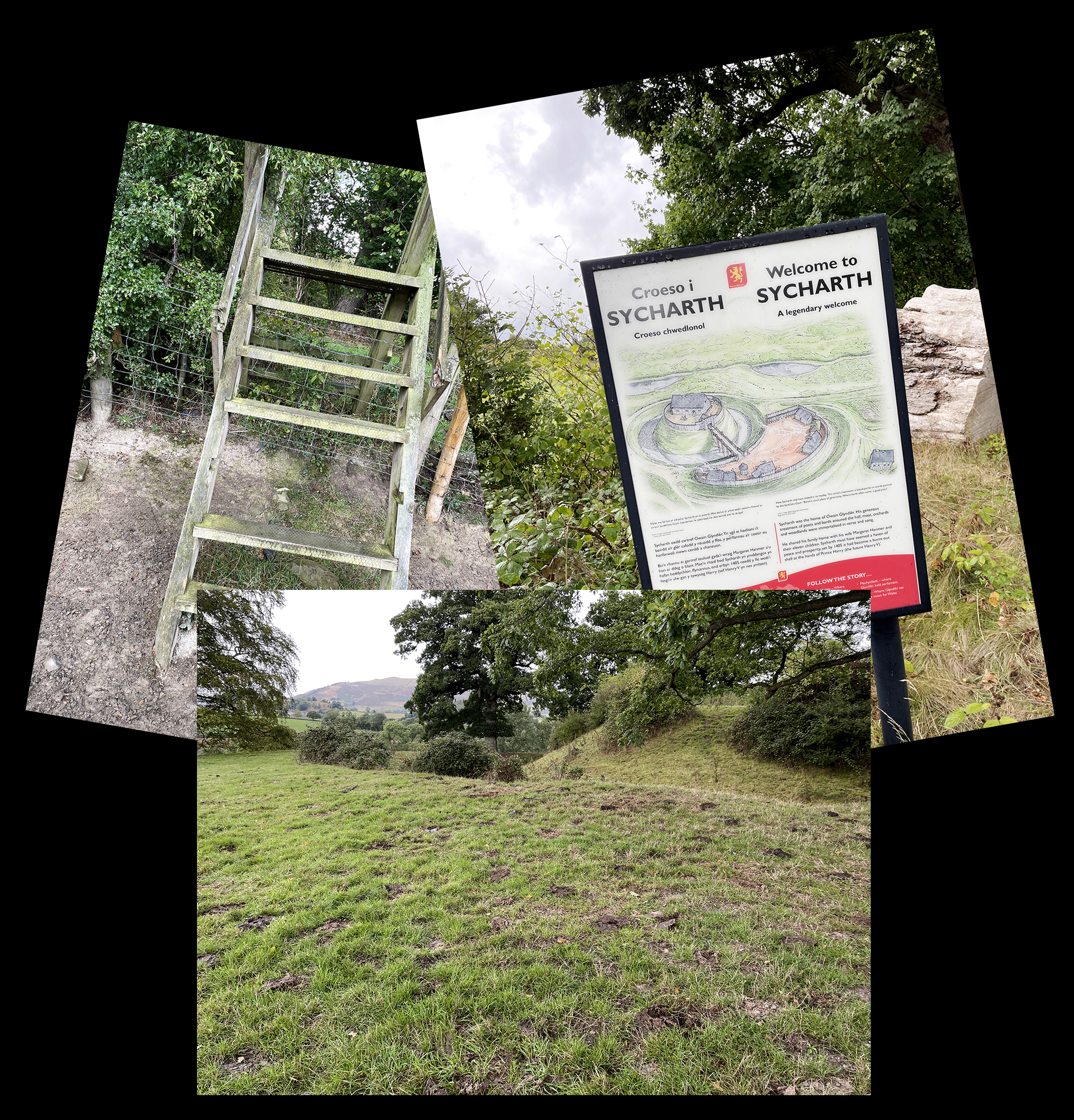
Here are the points he raised with Cadw:
- The stile to Sycharth is in a poor condition.
- Car parking is insufficient.
- The whole site is in a mess. An hour with a strimmer would do wonders.
- The information board does not mention much of Cymru’s history.
- Its neglect is a travesty and an insult to our past and heritage.
- Utterly shameful behaviour on your part.
To which Cadw responded with this. Which tells us the site belongs to the Llangedwyn Estate. More particularly, Nicholas Watkin Williams-Wynn.
A couple of phrases from the Cadw response are worth focusing on.
‘Sycharth . . . forms part of a working tenant farm under the Llangedwyn estate with permissive public access and parking at its discretion’.
‘Cadw installed the car park (four cars max) and access works (stile?) in 2010-2011 but their maintenance is again the responsibility of the owners.’
So it’s up to the Llangedwyn Estate whether people are allowed to visit Sycharth. And could, presumably, block public access. It’s also the Estate’s responsibility to maintain car parking and access. To judge by what I saw there, the Estate is doing its best to discourage visitors.
Is this some old dynastic feud being played out in the 21st century?
So I ask again: If the so-called ‘Welsh Government’ can find £4.25m to buy Gilestone farm for an English music festival, for purposes that are yet to be explained, why can’t it find the money to buy a site of national if not international importance and maintain it adequately and respectfully?
♦
FREELOADERS IN FREEPORTS
Freeports are back in the news. And it seems Wales is getting one. Either in Holyhead or Milford Haven and Port Talbot.
Let’s start in Holyhead.
Now the Conservative MP for Ynys Môn, Virginia Crosbie, is a big supporter of freeports, and has staked her reputation on turning a run-down ferry port into a beacon of global trade that will bring into Caergybi the riches of the Orient, the gold of the Indies, and of course – Guinness from Dublin.
Here she is setting out her ambition in a mercifully short video.
Though in truth, freeports rarely live up to their billing. And often involve very murky dealings. Private Eye has been following the evolution of the Tees Freeport in north east England. And produced the report below in the issue before last. (Available here in pdf format.)
N.B. Political donations are not to be confused with bribes and backhanders; and if friends of London politicians get juicy contracts then it can only be because their firms are best able to deliver.

Tees-side is a heavily built-up area, with a population pushing 380,000. And after the loss of its heavy industry – particularly steel – there is a widespread perception that the area is ‘owed something’.
Holyhead, by comparison, is a small town, with not much to speak about other than the ferry port to Ireland.
Until it closed in 2009, a major local employer was the Anglesey Aluminium smelter, with its private jetty. The plant received its electricity from Wylfa nuclear power station, some 15 miles away, another major employer that is now gone.
Roughly one thousand jobs paying good wages lost, but never mind, we’ll obey those who know best and stick in a few wind turbines and wave machines – plenty of jobs and unlimited cheap energy. Not.
The vacant site was taken over by Anglesey Aluminium Metal Renewables Ltd which in January 2016 became Orthios Power (Anglesey) Ltd. The site eventually being used for a plastics-to-oil operation.
But this folded earlier this year, with debts estimated at some £200m. And the end came suddenly, certainly for the staff. I’m told there was just a 10-minute warning not to start the next shift!
There are many Orthios companies listed with Companies House, none going back further than 2009 and most formed in the past three years. The ultimate holding company seems to be Orthios Operations Ltd, formerly Orthios Group (Holdings) Ltd.
So what happens now?
Well, the old smelter site has been bought by ferry operator Stena, and this is how a source on the island explains it . . .
‘Now of course they (Stena) can shift the dockside car parks elsewhere leaving nice waterside development plots. Just the sort of place to build a cable plant so they can load directly onto ships. The sort of cable company Virginia Crosbie MP was courting … the one owned by a Tory donor’.
He’s referring to Tratos, another local company hoping to benefit from offshore wind farms. Well, when I say ‘local’, it might be local if you were living in Italy. As the report makes clear.
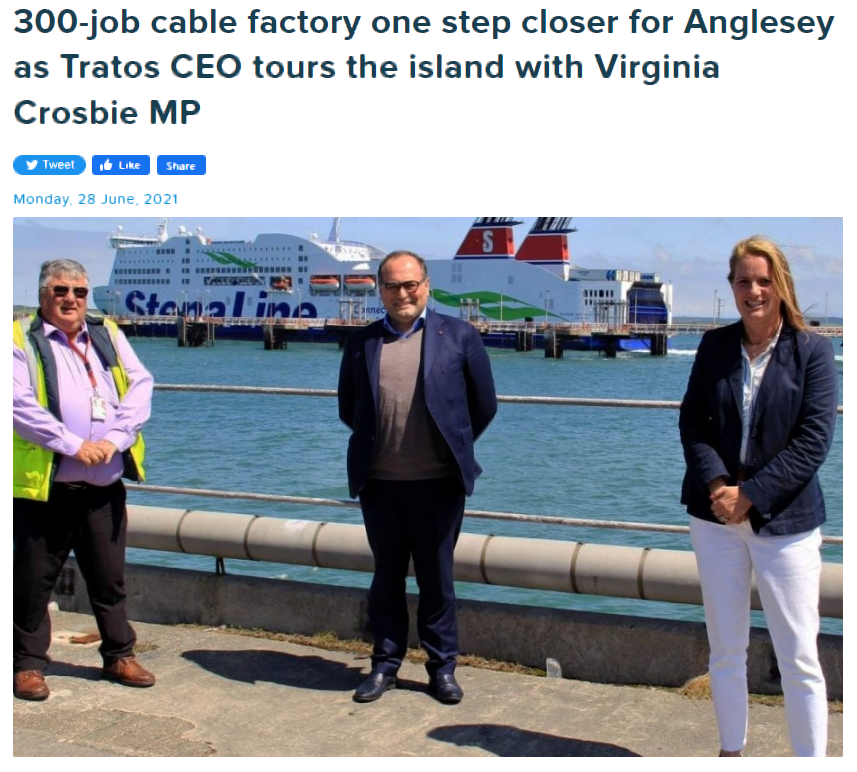
This further report will explain a bit more of what’s going. Though you may not need to read beyond the headline: ‘Holyhead could get 300 cable jobs if area gets freeport status – says firm run by Tory party donor’.
Not much more to say really. Stena is leading the Freeport bid, and now Stena is pulling out the stops to get an ‘anchor’ company located in Holyhead. As is the local MP.
To finish this piece on Holyhead I have to mention Jake Berry MP. Now Jake is MP for a constituency in north west England, but he owns a number of properties on Ynys Môn. During the Covid lockdown it was rumoured that Virginia Crosbie was living in a property owned by Berry.
In addition to his post as party chairman, new Prime Minister, Liz Truss (I know you’re all impressed!), has made Berry Minister without Portfolio. Which may not sound much, but it kind of gives him a free hand.
That appointment was announced September 7. The day before the announcement, Berry resigned from the Northern Research Group Ltd (northern English Tory MPs), where he held the controlling interest. Also from Ford Bridge Farm Ltd.
Now why would he do that?
Ford Bridge Farm is of course an English rendering of his – or his wife’s – Rhyd y Bont farm at Rhoscolyn, on Holy Island. This is the smaller island, off the main island, and where Holyhead is located. Which means that Jake would be very close should the freeport materialise. A neighbour!

Does Jake Berry anticipate benefitting in some way from a freeport at Holyhead? Or am I being too cynical? Cynical! Moi!
∼
By comparison, the southern rival seems far less well advanced. In fact, we could be forgiven for thinking it’s hardly off the ground. This report would suggest that it was launched as recently as last week.
Though this piece from November 2020 suggests the Port of Milford Haven has been thinking about a freeport for some time.

The more recent activity may be due to the fact that in May it was announced that the 45km limit (for the extent of freeport status) could be extended in Wales. This could certainly explain the southern bid combining Milford Haven with Port Talbot.
Which are 87km apart, as the fabled crow flies.
This somewhat bizarre combination is presumably justified by links between Milford Haven and Swansea Bay. As show in the image below. Which strikes me as being a wee bit desperate. For example, the Llandarcy refinery closed in 1998.
And would a freeport in Milford make the oil, gas, or electricity flow any faster?

My insular source believes that for all sorts of reasons the southern bid will win out. I’m not so sure. For with local boy Jake Berry working his magic behind the scenes, and his good friend Virginia Crosbie staking her political reputation on it, I would not be at all surprised to see the £26m freeport pot head up the A5 rather than down the M4.
But whichever direction the loot heads the lucky recipients will need to watch out for sharks circling – but these won’t be in the water. They’ll be arriving in Beemers and hoping to dazzle with PowerPoint presentations and insincere smiles.
And, dare I say it, ‘inducements’. There, I’ve said it.
And I say it because a freeport in either Holyhead or Milford / Port Talbot will attract grifters like the fresh laverbread stall in Swansea market draws discerning gourmets.
♦
NAILING THE VOICES?
This section is decidedly odd, and I wasn’t sure about using it, so please understand if certain details are withheld. (Especially towards the end.) But I do have the information and the relevant documents.
It started when someone got in touch, saying she had information on Gilestone, but what she offered was unconnected incidents jumbled up with snippets from hither and yon.
The long and winding road somehow took us to Ammanford. And Alan Delaney Tait. If the name rings a bell it’s because Tait claims to hear voices of women and children being abused, hurt, even killed. These sounds either come from beneath his property or from tunnels nearby.
Tait has turned his ‘voices’ into a cottage industry. With many videos on YouTube and other platforms. That said, they don’t get many views. This one, with 40k, is probably the most popular.
Most people, including the local police, dismiss Tait as a publicity-seeking crank. No tangible evidence of human trafficking has ever been found. In fact, there is nothing beyond Tait’s recordings; and as has been pointed out, these could have been made anywhere.
Doing a quick check for Tait on the Companies House website turned up some interesting stuff. Now I’m not sure from where Tait originates, but he’s been living in Ammanford in recent years.
And yet Companies House gives out eight companies for ‘Alan Delaney Tait’ with addresses in Ystalyfera, in the Swansea Valley.
With other companies where he drops the ‘Delaney’ and becomes plain ‘Alan Tait’.
Such as Alan Dee UK Ltd. (I love the way some use ‘UK’, hoping their enterprise will be mistaken for the local branch of a global empire.) Then there’s UKWide Contract Services Ltd, ADT UK Wide Ltd and, finally, Number Plates Online Ltd.
In recent years the focus of operations seems to have switched to Derbyshire, in the East Midlands. With The Three Boars Guesthouse Ltd and Chal Rentals Ltd.
For these Derbyshire-based companies Tait has as co-director the gloriously monikered Carlos von Gallo. Who has his own YouTube channel, where he puts out nothing but Tait’s Ammanford ‘recordings’.
‘Von Gallo’ is listed as the sole shareholder at the two companies’ deaths, but does he really exist?
What the 14 companies I’ve given here have in common is that after a short life – in some cases very short – they all went under. There are no survivors.
Something else I found intriguing was that for almost all Tait’s companies there was an issue of a single £1 share (if it was him alone) or £2 if there was another director (Tait’s wife or ‘von Gallo’). With two notable exceptions.
These were The Old Coal Store, with a share issue of £25,000, and Barlas Eren Sezer Ltd, with a share issue of £125,000.

I don’t wish to cast aspersions but, if I had money I couldn’t account for, then disguising it as a share capital in a company doomed to fail, might have its attractions.
In his ‘voices’ videos Tait points the finger at the nearby Sophia Nails. He further claims that the leaseholder was a Vietnamese woman named Trang Thanh Tran. She is now said to run T Nail Spa in the centre of Swansea.
There is a company of that name where she is listed as sole director. But the single £15,000 share is held by Thi Hai Nhung Nguyen who gives as his address another nail bar, this one on Chepstow Road in Newport.
Tran’s partner, or husband, Quang Lam, was the leaseholder in Ammanford and also at Heaven Nails in Llanelli. He was sent down for 5 years for belonging to a gang growing and distributing cannabis.
There are a number of ‘Heaven Nail’ companies, all but one run by Vietnamese nationals.
The Vietnamese connection may be significant because some comments to the YouTube videos claim to have heard Vietnamese being spoken by the ‘voices’.
But the problem with Tait is that even if he’s telling the truth about the voices, and the Vietnamese connection, one look at his business record tells us that he is, to put it generously, ‘unlucky’, with so many failed companies to his name.
∼
Despite Tait being so ‘unlucky’, I was still left wondering . . . and so, motivated by nothing beyond idle curiosity, I Googled ‘Sophia Nails’, the name of the Ammanford salon. What popped up was the Sophia Nail Spa in Porth, in the Rhondda.
At which point things got a bit strange.
For in February this year a company, Sophia Nail Spa Ltd, was launched. The only director is a 23-year-old Vietnamese named Thien Van Hoang.
And although the company uses 22 Hannah Street, Porth, as its correspondence address, the Certificate of Incorporation gives Hoang’s address as 31 Ridley Terrace, Sunderland.

At this point is might be worth suggesting a few things.
- First, whoever’s running the Porth nail bar may know nothing about the company that’s using the same name.
- Next, Thien Van Hoang may not even know he is named as director of Sophia Nail Spa Ltd. I have come across other examples of people being listed as company directors without their knowledge.
- Finally, Thien Van Hoang may never have visited Sunderland.
But to find another Vietnamese connection is intriguing. Not least because it seems nail bars are used by Vietnamese criminals for exploiting women and girls, also for money laundering. The same gangs that are involved with cannabis. And not just in the UK.
Just type ‘Vietnamese nail bars trafficking’ into your search engine and you’ll bring up countless news reports. It’s big business.
Which may also explain Sophia’s Nail Bar at 9 Oxford Street, Mountain Ash. (Shown in image below.) Which more recently seems to have been known as New Star Nails. Which again is odd, because a company of that name folded in July 2018.
The secretary and the only director are both of Vietnamese extraction.

Returning to Porth, if we look at the building in which Sophia Nail Spa is located we see a block – 20-25 Hannah Street – with a second floor and, in part, a third floor.
Another company listed at this block was a sporting establishment (darts, snooker, etc), on the first floor, which in July changed its name and apparently became a bar. All the old directors left and a single new director arrived, a 22-year-old woman with an unmistakably Welsh name.
I’m not saying young Welsh women shouldn’t run bars, but . . .
For a start, ingress and egress to a bar on the first floor will only be possible by a flight of stairs from the street. Would a council – even Rhondda Cynon Tâf – grant a drinks licence to a place where people would regularly fall or be pushed down the stairs?

On a weekend a fleet of ambulances would be needed to carry away the injured. And as we know, Wales doesn’t have a working fleet of ambulances.
Something’s not right. The old Jac nose is all a-quiver.
From countless previous cases in Wales and across Europe, Vietnamese nationals owning or running nail bars should have aroused the suspicions of both local councils and the police.
Finally, the company that owns that 20-25 block on Hannah Street in Porth is based just a mile and a half, as the crow flies, from Gilestone Farm!
I am not suggesting anything. It’s just a small world and Wales is a small country.
♦
THE OLD FOLKS AT HOME
Someone contacted me suggesting I might be interested in the latest in a series of bad news stories about care homes. And this one really is bad.
Like so many of the care homes in Wales, Pontypridd Nursing Home is run by a company based outside of Wales. In this case, RB Care Homes Ltd, of Chislehurst in Kent. The RB stands, presumably, for director Raqia Bibi.
I can’t find a website but there is a Twitter account with nothing posted for three years. It’s a similar story with the Facebook page.
I suspect this company has gone under. Maybe not officially, but Companies House is still waiting for accounts that should have been submitted by November 30 last year. I don’t think they’re coming.

Despite the parlous state of RB Care Homes, and other companies of hers we’ll look at in a minute, Raqia Bibi was, as late as June this year, being held up as an exemplar of good practice in the sector!
Truly amazing!
Pontypridd Nursing Home wasn’t Ms Bibi’s first venture into care homes, nor her first foray into Wales. For she has a string of companies behind her, including you’ll notice, Wrexham Care Centre.
Where some three years ago she also made the news for the wrong reasons. You’ll see that her partner in Wrecsam was Mohanananthan Kuhananthan. With whom the story takes a bit of a twist. But be patient.
For a start, Wrexham Care Centre Ltd was always a dormant company, with money going through Nant-y-Gaer Ltd, which is also in administration.
Then, you’ll remember that the news report I linked to at the top of this section said that the Pontypridd Nursing Home is run by RB Care Homes Ltd, which may be true. But that company has also been filing as dormant since it was Incorporated in February 2017.
The report made no mention of Pontypridd Care Home Ltd, owned by Mohanananthan Kuhananthan. With Raqia Bibi as co-director. Which may be explained by the fact that it’s this company that actually owns the property on Maesycoed Road, for which it claims to have paid £1.5m in May 2012.
Which means that while local authorities and others go chasing dormant companies for money those companies don’t have, the assets themselves are owned by companies they may know nothing about. It’s a popular trick.
Maybe Wrecsam and Rhondda Cynon Tâf councils, or anyone else owed money from the collapse of nursing / care homes, should consult their lawyers about refocusing any claims.
Kuhananthan has other companies. Many companies. Four under the Comfort Care Homes brand suggest operations in Wales. With, in some cases, money owed to the Development Bank of Wales. These relate to the Danygraig Nursing Home, in Newport.
What I find extraordinary is that these DBW loans were made in June, when it would have been obvious, after the most cursory of enquiries, that not only are Kuhananthan’s companies in deep trouble, but that the man himself may not be entirely above board.
UPDATE 10.10.2022: It may be worth clarifying that Kuhananthan was no longer a director of Comfort Care Homes (Danygraig) Ltd when the DBW loans were made, and Bibi had never been a director. But this company is owned by Dream Care Homes (RB) Ltd, formed in December 2021. And while they’re not shown as directors of this company either, I suspect the ‘RB’ tells us something.
Kuhananthan’s Welsh involvement doesn’t end with the examples given.
Through the company Mufulira Ltd, which Kuhananthan joined in May 2018, and was followed by Raqia Bibi in July 2021, they own Ridgeway Care Centre in Pembrokeshire, which must be worth a few bob.

In fact, the latest accounts seem to value Ridgeway at just short of two million pounds. That said, while it might be owned by Mufulira – another company in trouble – Mufulira itself is owned by Comfort Care Homes Ltd, which we know is yet another Kuhananthan and Bibi company.
Maybe Pembrokeshire County Council should also be on alert, and realise who owns Ridgeway. But then, Kuhananthan-Bibi companies appear to have no assets beyond the buildings, all of which have loans or mortgages against them.
I didn’t have the time to go any deeper, but I suggest for anyone so inclined, that Kuhananthan and Bibi are worthy of further investigation.
Before finishing this section, here’s another interesting connection.
We earlier encountered Nant-y-Gaer Ltd, which I suggested was the Kuhananthan-Bibi company actually running the home of that name in Wrecsam. (Now ‘Wrexham Care Centre’.) But there’s also a Nant-y-Gaer Hall Ltd.
When going through the details for Nant-y-Gaer Hall Ltd I noticed that Kuhananthan gave as his address 83 Dyserth Road in Rhyl. Where we find Sandy Lodge Hospital, run buy Medirose Healthcare.
A company formed as recently as November 2020 and filing as dormant.
However, 83 Dyserth Road is owned by HuaTong Ltd, a company that somehow manages to make a loss every year. The directors and owners are Chinese citizen, Wang Liu, and Sharvanandan Arnold, who has cropped up before in connection with fellow Sri Lankan Mohanananthan Kuhananthan
I conclude that care for the elderly in Wales is an utter shambles. It’s attracting unscrupulous if not crooked operators. They’re drawn by easy money and the lack of adequate oversight.
As a start, and a show of intent, I would like the ‘Welsh Government’ and Care Inspectorate Wales to announce they will not register or deal with any care home, nursing home, or other facility, where Mohanananthan Kuhananthan and Raqia Bibi are involved.
To lighten the mood a little, though not too much . . .
I genuinely worry about the care of the elderly because I’m not getting any younger myself. Will I be properly taken care of when my kids dump me in the Uncle Joe Sunshine Home for Unrepentant Fascists and Incorrigible Transphobes?
♦
SOURCES
I had planned to have a section dealing with information I’d received from a source somewhere within the ‘Welsh Government’ detailing the nepotism and corruption all around.
And of the power wielded by those connected with housing associations, often in areas that have nothing to do with housing, and how the Wales Council for Voluntary Action is almost an arm of government.
Also some of the names I’m called in Corruption Bay. Some so bad he / she couldn’t even put them into print! Well, I was mortified. Mortified, I was!
But on reflection I feel it could be dangerous for this person if I was to go into details. So I’ll leave it there.
The information I’ve received thus far was posted anonymously to Gwlad and passed on to me. But I do wish to maintain contact.
So we need to think how this might be achieved.
♦
GLOBALISTS
In recent years it has become increasingly clear to me that much of what I report on is simply the ‘Welsh Government’ and various agencies in Wales adopting and promoting agendas dreamt up elsewhere.
‘London’, is only part of the answer. And an increasingly irrelevant part.
A few years ago I wouldn’t have been writing this, but the Covid ‘pandemic’ and the way it was seized upon by politicians and others opened my eyes, and it helped me see the bigger picture.
That bigger picture of unelected, supranational bodies imposing agendas on governments and other institutions that impact on just about everybody on Earth.
In particular, I’m referring to the World Economic Forum. Made up of politicians, bankers, and multi-billionaires like Bill Gates, George Soros and Mark Zuckerberg. This self-electing elite – like almost all previous elites in human history – believes it is made up of essentially decent people, who are obviously smarter than the rest of us, and should therefore run the world.

It reminds me of a couple of lines from Tom Paxton’s 1960s protest song, Daily News.
J. Edgar Hoover is the man of the hourAll that he needs is just a little more power
Just like J Edgar Hoover all the new global elite needs is a little more power. And then a little more. And then . . .
(Never agreed with his politics but I always thought Paxton was the best – certainly the most versatile – of the 60s folk / protest singer-songwriters. Love songs, political songs, humorous songs, kids’ songs, he could do them all.)
The principal tool the new elite uses to exert control and impose its agenda is climate disaster. Just like the Nazis they realise that to impose your will you need to frighten people with an imagined or overblown ‘threat’.
For the Nazis, it was the Jews, the Communists, Versailles; but for Klaus Schwab and his gang it’s global warming – and it’s all our fault. So we must change our behaviour to make up for the damage we cause, in ways that will be decided for us.
And it’s the West that must be targeted. Partly because the West is the richest and most advanced area of the globe, and also because concepts of individual liberty are more highly developed and valued in the West than most other parts of the world.
This explains the many-fronted attack on Western civilisation by the globalists and their foot-soldiers on the Left. With their initiatives denied / defended / promoted / hidden / (depending on requirements) by their allies in Mainstream Media and Big Tech.
It also explains much of what we see in Wales: the war on farmers, the lack of spending on infrastructure, the 20mph speed limit, our hills being ravaged by wind farms.
The crises we see approaching, food shortages due to the war on farmers, power cuts thanks to a campaign against fossil fuels and increased reliance on useless ‘renewables’, no petrol or diesel to run our vehicles, being locked out of your bank account for holding the ‘wrong’ views, political unrest resulting from these problems, unnecessary lockdowns and dangerous vaccinations justified by a virus with increasingly suspect origins, even the war in the Ukraine, have all been engineered, and could all have been avoided.
Because it’s all about control. Over us. By them.
Compared to forced chipping of children, and silencing those who challenge the WEF narrative, Lee Waters stuffing the National Infrastructure Commission with cronies representing housing associations, Sustrans / Deryn (Waters is ex Sustrans himself), and the M4 corridor, is small beer.
And no less than we have come to expect from Welsh politicians.
∼
I’ll end with a little history lesson cum allegory that might explain how I see things.
Carlos Marcello was the Mafia boss of New Orleans for many years, and one of the most powerful gangsters in the USA. Then in 1960 John F Kennedy became President; he appointed his brother Bobby as Attorney-General, and Bobby went after the Mob.
Predictably, many leading figures in organised crime wanted to whack Bobby Kennedy; but Marcello sagely observed that if you cut off a dog’s tail he can still bite you, so it was better to go for the head.
Which helps explain why Marcello is strongly suspected of being implicated in JFK’s assassination in Dallas on November 22, 1963. He probably was involved, but this wasn’t a straightforward Mafia hit, and they didn’t act alone.
The point I’m making is that I’m spending too much time on a ‘tail’. And while I shall continue to report idiocy like Gilestone, in future I intend paying more attention to the ‘head’.
♦ end ♦


